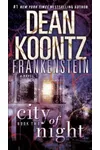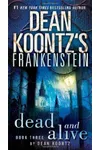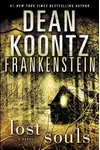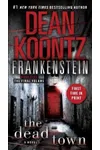Step into the shadowy streets of New Orleans, where Dean Koontz’s Frankenstein series reimagines a classic tale with a thrilling twist! This five-book saga blends horror, thriller, and science fiction, pitting Victor Frankenstein—now the cunning Victor Helios—against his original creation, Deucalion, and two tenacious detectives. It’s a pulse-pounding battle for humanity’s future that’ll keep you up past midnight.
Koontz takes Mary Shelley’s gothic masterpiece and infuses it with modern stakes, exploring what happens when science spirals out of control. With a cast of unforgettable characters and a setting dripping with mystery, this series is a must-read for fans of suspense and speculative fiction. Ready to dive into this reimagined legend?
How Dean Koontz’s Frankenstein Began
Inspired by C.S. Lewis’s The Abolition of Man, Dean Koontz crafted his Frankenstein series to probe the dangers of hubristic science. Launched in 2004, the project began as a TV movie concept for USA Network, co-written with Kevin J. Anderson. Creative differences led Koontz to pivot, transforming the idea into a novel series that reworks Shelley’s myth for the 21st century. The result? A chilling narrative that feels both timeless and urgently relevant.
Koontz’s vision was to explore what happens when a creator’s ambition outstrips morality. Set in modern New Orleans, the series introduces a Victor Helios who uses cutting-edge synthetic biology to craft a ‘New Race’—bioengineered beings designed to replace humanity. It’s a bold premise that hooked readers from the start.
The Heart of Dean Koontz’s Frankenstein
The series kicks off with Prodigal Son (2004), where Deucalion, Frankenstein’s first creation, returns to New Orleans to confront his maker, now Victor Helios. Detectives Carson O’Connor and Michael Maddison stumble into the fray, investigating bizarre murders linked to Helios’s creations. City of Night (2005) ramps up the tension as Helios’s New Race grows more unstable, threatening chaos.
Dead and Alive (2009) concludes the initial trilogy, with Deucalion and the detectives racing to stop Helios’s apocalyptic plan. The series continues with Lost Souls (2010) and The Dead Town (2011), shifting to Rainbow Falls, Montana, where survivors band together against Helios’s final assault. Themes of creation, morality, and redemption weave through the narrative, with Koontz’s signature blend of witty dialogue and heart-stopping suspense. New Orleans’s eerie backdrop and later Montana’s isolation amplify the horror, making every page a thrill.
Koontz explores the ethics of playing god, questioning whether creator or creation bears the greater monstrousness. Deucalion, a soulful ‘monster’ seeking redemption, contrasts Helios’s cold ambition, while Carson and Michael ground the story with human resilience. Fans praise the series for its fast pace and thought-provoking depth, though some note the later books lean heavily on action.
Why Dean Koontz’s Frankenstein Resonates
Dean Koontz’s Frankenstein has carved a niche in horror and thriller circles, blending speculative fiction with moral quandaries. Its exploration of scientific overreach feels eerily prescient in an era of AI and genetic engineering. Fans on platforms like Goodreads laud its reimagining of Shelley’s tale, with characters like Deucalion and the quirky Jocko stealing hearts. Despite mixed reviews on the series’ later entries, its bold narrative and Koontz’s storytelling prowess keep readers hooked.
The series’ legacy lies in its ability to make a 200-year-old story feel fresh, sparking discussions on humanity’s limits. Plans for a TNT series and a feature film, though unrealized, underscore its cultural ripple. For Koontz fans, it’s a standout in his vast catalog, rivaling his beloved Odd Thomas series.
- About Dean Koontz’s Frankenstein
- Publication Years: 2004–2011
- Number of Books: 5
- Genres: Horror, Thriller, Science Fiction
- Setting: New Orleans, Louisiana, and Rainbow Falls, Montana
Grab Prodigal Son and plunge into Dean Koontz’s Frankenstein—a world where horror meets heart, and every twist dares you to keep reading!




